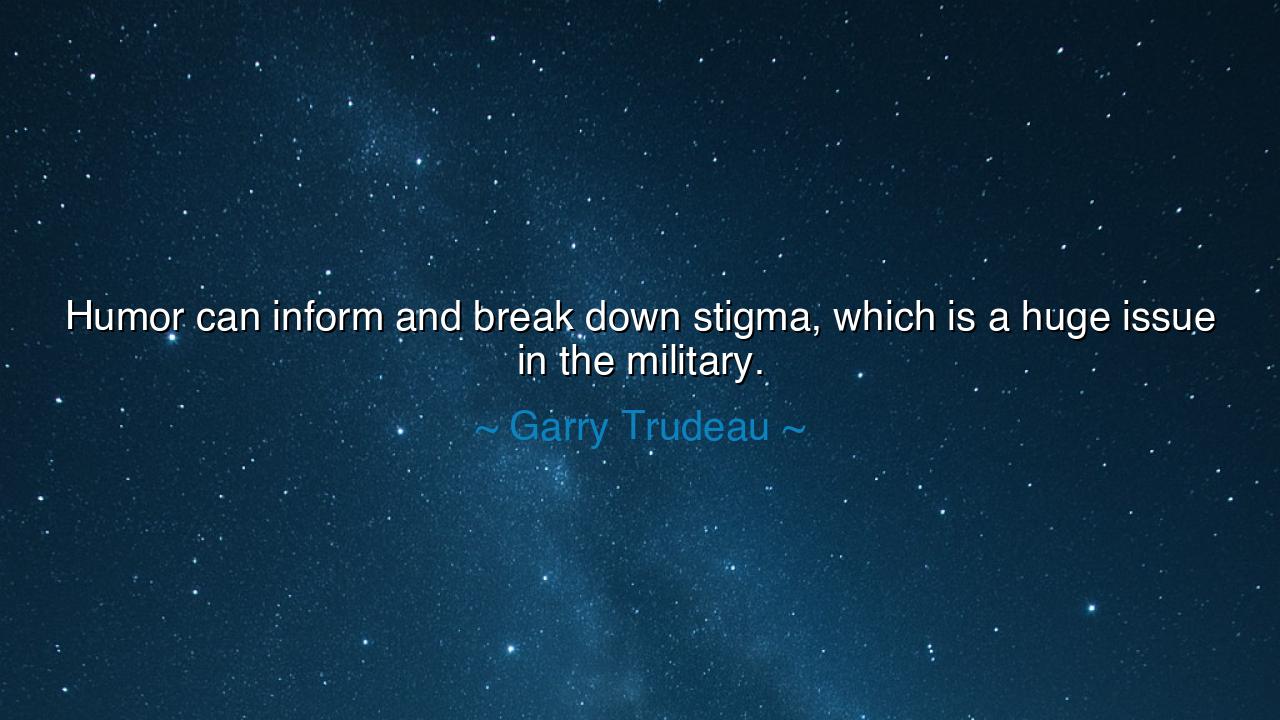
Humor can inform and break down stigma, which is a huge issue in






The words of Garry Trudeau — “Humor can inform and break down stigma, which is a huge issue in the military.” — carry the gravity of a truth forged in the fires of courage and compassion. Though he speaks as a humorist, his insight belongs to the lineage of philosophers and healers. For in his simple declaration lies a profound understanding: that laughter, far from being trivial, can be a weapon against silence, fear, and shame. Humor, in its highest form, is not a distraction from pain — it is a language of survival, a bridge between wounded souls, a light that enters where solemnity cannot.
Trudeau, the creator of Doonesbury, has long been a chronicler of the American soldier’s experience — of the humanity that persists behind the uniform. Through satire and wit, he has addressed the unspoken struggles of those who serve: the moral fatigue, the invisible wounds, the isolation that follows war. To say that humor can break down stigma is to recognize that laughter can do what reason and authority cannot — it can open hearts. In the military, where strength is idolized and vulnerability is hidden, humor becomes a way to tell the truth without punishment. It disarms pride and makes confession safe.
The origin of this truth stretches deep into history. The warriors of old — from the Roman legions to the samurai of Japan — often used humor to endure the unbearable. Roman soldiers, weary from battle, carved jokes into their shields and barracks walls. It was not mere jest, but an act of defiance — laughter in the face of fear. Even in the trenches of World War I, soldiers sang absurd songs about mud and misery. Their humor did not deny suffering; it humanized it. It allowed them to reclaim control over the one thing the battlefield sought to strip away — their humanity.
Trudeau’s observation that humor can inform reveals another ancient truth: that laughter is a teacher. The philosopher Plato once wrote that in jest there is truth. Through humor, difficult subjects — trauma, hierarchy, injustice — can be confronted without bitterness. A well-crafted joke can do what no sermon can achieve; it slips wisdom past the defenses of pride. When a soldier laughs at the absurdity of stigma, he acknowledges its existence — and begins to dismantle it. When society laughs with compassion, it learns to see the soldier not as a symbol, but as a person.
Consider the story of Joseph Heller, the author of Catch-22. Through biting satire, he revealed the insanity of war — the endless cycles of bureaucracy and suffering that devoured men’s souls. His work, though comic, was deeply tragic. And yet, through humor, he reached the hearts of millions who would have turned away from a purely serious account. Like Trudeau, Heller knew that laughter does not belittle pain; it helps us bear it. His dark humor became an act of rebellion against despair — an assertion that even in madness, truth can still be spoken.
To speak of stigma in the military is to speak of silence — of wounds unseen, of the soldier’s burden to appear invulnerable. Trudeau’s insight reminds us that humor can pierce that silence. When soldiers tell jokes about their fears, they do not mock themselves — they reclaim their dignity. When artists and writers like Trudeau turn the lens of laughter upon the institutions that suppress truth, they give permission for honesty. Through satire, he invites both soldier and civilian to laugh together — not at the suffering, but at the pretense that suffering must remain hidden.
The lesson, then, is timeless and urgent: use humor not to escape reality, but to illuminate it. When you laugh with empathy, you create space for healing. When you use wit to expose injustice or stigma, you give voice to those who have been silenced. Humor should never be cruelty disguised as cleverness; it should be kindness armed with courage. The ancients called this parrhesia — the freedom to speak truth boldly, yet with grace. This is the humor Trudeau speaks of: laughter as liberation.
And so, dear listener, take this wisdom into your own life. When faced with darkness, do not always meet it with solemnity — sometimes, meet it with laughter. When you encounter shame or stigma, use humor to soften hearts, to reveal truth, to remind others of our shared humanity. For as Garry Trudeau teaches, laughter is not a luxury of peace — it is the discipline of the brave, the wisdom of the compassionate, and the enduring light of those who refuse to let silence win.






AAdministratorAdministrator
Welcome, honored guests. Please leave a comment, we will respond soon